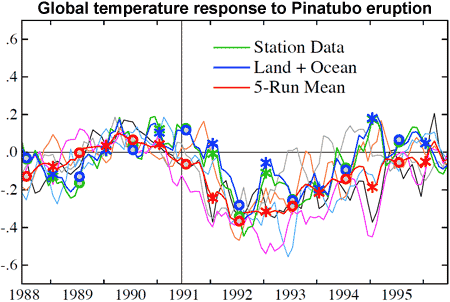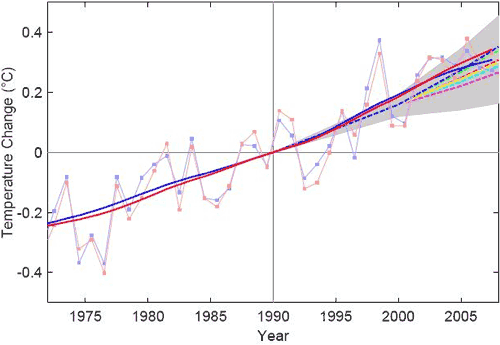 Arguments
Arguments
 Software
Software
 Resources
Comments
Resources
Comments
 The Consensus Project
The Consensus Project
 Translations
Translations
 About
Support
About
Support


Latest Posts
- Fact brief - Is climate change a net benefit for society?
- Skeptical Science New Research for Week #16 2025
- Climate Adam: Climate Scientist Reacts to Elon Musk
- Sabin 33 #24 - Is wind power too expensive?
- EGU2025 - Picking and chosing sessions to attend on site in Vienna
- 2025 SkS Weekly Climate Change & Global Warming News Roundup #15
- Fact brief - Is the sun responsible for global warming?
- Skeptical Science New Research for Week #15 2025
- Renewables allow us to pay less, not twice
- Sabin 33 #23 - How much land is used for wind turbines?
- Our MOOC Denial101x has run its course
- 2025 SkS Weekly Climate Change & Global Warming News Roundup #14
- Fact brief - Is Mars warming?
- Skeptical Science New Research for Week #14 2025
- Two-part webinar about the scientific consensus on human-caused global warming
- Sabin 33 #22 - How does waste from wind turbines compare to waste from fossil fuel use?
- Clean energy generates major economic benefits, especially in red states
- 2025 SkS Weekly Climate Change & Global Warming News Roundup #13
- Skeptical Science New Research for Week #13 2025
- Climate skeptics have new favorite graph; it shows the opposite of what they claim
- Sabin 33 #21 - How does production of wind turbine components compare with burning fossil fuels?
- China will need 10,000GW of wind and solar by 2060
- 2025 SkS Weekly Climate Change & Global Warming News Roundup #12
- Skeptical Science New Research for Week #12 2025
- Climate Fresk - a neat way to make the complexity of climate change less puzzling
- Sabin 33 #20 - Is offshore wind development harmful to whales and other marine life?
- Do Americans really want urban sprawl?
- 2025 SkS Weekly Climate Change & Global Warming News Roundup #11
- Fact brief - Is waste heat from industrial activity the reason the planet is warming?
- Skeptical Science New Research for Week #11 2025
Archived Rebuttal
This is the archived Intermediate rebuttal to the climate myth "Scientists can't even predict weather". Click here to view the latest rebuttal.
What the science says...
|
Weather is chaotic, making prediction difficult. However, climate takes a long term view, averaging weather out over time. This removes the chaotic element, enabling climate models to successfully predict future climate change. |
This argument betrays a misunderstanding of the difference between weather, which is chaotic and unpredictable and climate which is weather averaged out over time. While you can't predict with certainty whether a coin will land heads or tails, you can predict the statistical results of a large number of coin tosses. Or expressing that in weather terms, you can't predict the exact route a storm will take but the average temperature and precipitation will result the same for the region over a period of time.
Climate prediction is a difficult and ever refining art. There's the problem that future behaviour of the sun is very difficult to predict. Similarly, short term perturbations like El Nino or volcanic eruptions are difficult to model. Nevertheless, climate scientists have a handle on the major drivers of climate.
James Hansen's 1988 climate predictions
Way back in 1988, James Hansen projected future temperature trends (Hansen 1988). Those initial projections show remarkable agreement with observation right to present day (Hansen 2006). Hansen even speculated on a volcanic eruption in 1995 but missed the date by a few years (we'll cut him some slack there).

Figure 1: Hansen's model projections (green, blue, purple) compared to observations (red and black).
Hansen's Scenario B (described as the most likely option and in hindsight, the one that most closely matched the level of CO2 emissions) shows close correlation with observed temperatures. In fact, Hansen overestimated future CO2 levels by 5 to 10% so if his model was given the correct forcing levels, the match would be even closer. There are deviations from year to year but this is to be expected. The chaotic nature of weather will add noise to the signal but the overall trend is predictable.
Modelling the aftermath of the Mount Pinatubo volcanic eruption
When Mount Pinatubo erupted in 1991, it provided the opportunity to test how successfully models could predict the climate response to the sulfate aersol injected into the atmosphere. The models accurately forecast the subsequent global cooling of about 0.5 °C soon after the eruption. Furthermore, the radiative, water-vapor, and dynamical feedbacks included in the models were also quantitatively verified (Hansen 2007).

Figure 2: Observed and simulated global temperature change during Pinatubo eruption. Green is observed temperature by weather stations. Blue is land and ocean temperature. Red is mean model output (Hansen 2007).
Comparing IPCC projections to observations
Recent Climate Observations Compared to Projections (Rahmstoorf 2007) compared 2001 IPCC projections of global temperature change (coloured dotted lines) with observations from HadCRUT (blue) and NASA GISS data (red). The thin lines are the observed yearly average. The solid lines are the long term trends, which filter out short term weather fluctuations.
 Figure 3: courtesy of Tamino: Solid blue and red lines are trends from GISS and HadCRU data, dashed lines are IPCC projections.
Figure 3: courtesy of Tamino: Solid blue and red lines are trends from GISS and HadCRU data, dashed lines are IPCC projections.
It's immediately apparent the IPCC underestimated temperature rise with observations warmer than all projections (but inside the grey uncertainty area). The paper proposes several possible reasons for the difference. One is intrinsic internal variability which is possible over such a short period. Another candidate is climate forcings other than CO2 such as aerosol cooling being smaller than expected.
A third candidate is an underestimation of climate sensitivity. The IPCC assumed a climate sensitivity of 3°C with an uncertainty range between 1.7° to 4.2°C (this is indicated in the grey area of Figure 2). However, there are a number of positive feedbacks in the climate system that are poorly understood and hence not given much influence in IPCC models. Add to this the fact that model uncertainty is inherently skewed towards greater sensitivity. My guess is higher climate sensitivity is part of the story but not all. More on IPCC's 2001 projections...
Other results successfully predicted and reconstructed by models
- Cooling of the stratosphere
- Warming of the lower, mid, and upper troposphere
- Warming of ocean surface waters (Cane 1997)
- Trends in ocean heat content (Hansen 2005)
- An energy imbalance between incoming sunlight and outgoing infrared radiation (Hansen 2005)
- Amplification of warming trends in the Arctic region (NASA observations)
Intermediate rebuttal written by John Cook
Update July 2015:
Here is a related lecture-video from Denial101x - Making Sense of Climate Science Denial
Updated on 2016-10-25 by pattimer.
THE ESCALATOR

(free to republish)
























































